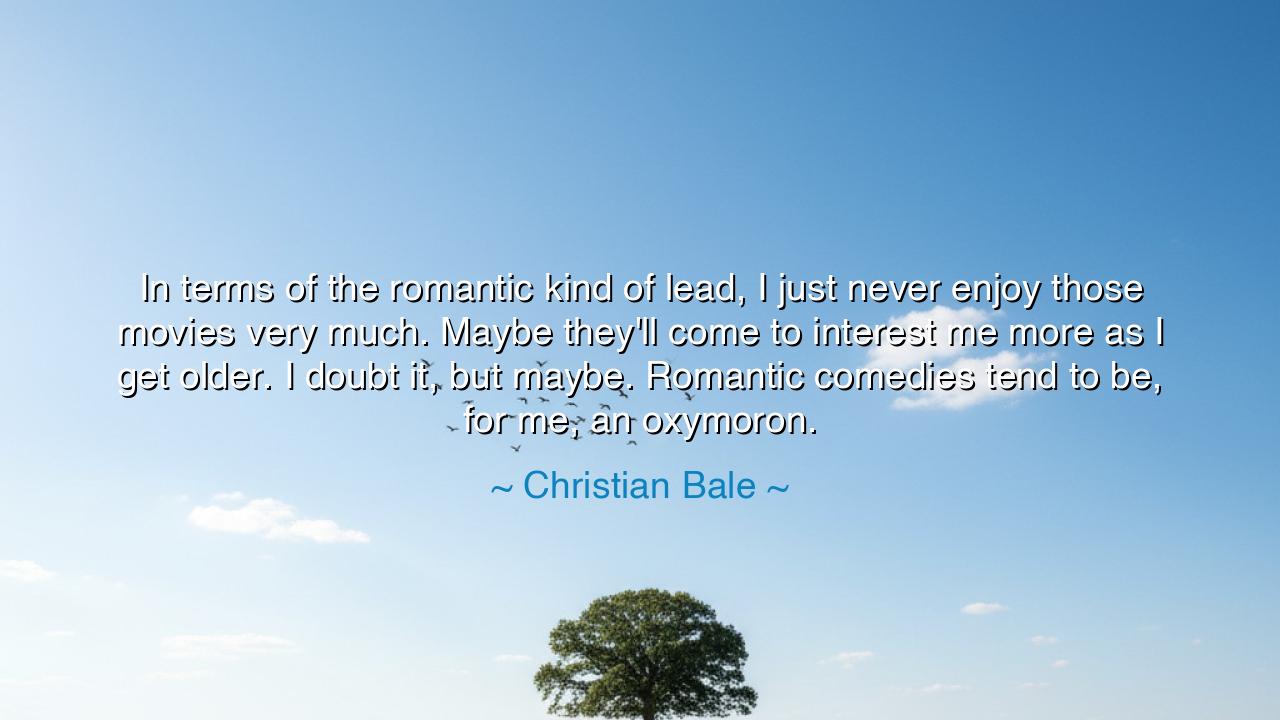
In terms of the romantic kind of lead, I just never enjoy those
In terms of the romantic kind of lead, I just never enjoy those movies very much. Maybe they'll come to interest me more as I get older. I doubt it, but maybe. Romantic comedies tend to be, for me, an oxymoron.






In the words of Christian Bale, “In terms of the romantic kind of lead, I just never enjoy those movies very much. Maybe they’ll come to interest me more as I get older. I doubt it, but maybe. Romantic comedies tend to be, for me, an oxymoron.” This confession reveals the mind of a man drawn not to illusions of love, but to the harsher truths of life, where laughter and passion are not easily joined. For Bale suggests that the pairing of romance and comedy often diminishes both, making the sacred seem trivial and the lighthearted seem burdened. His words awaken us to the tension between depth and play, between gravity and levity, and the difficulty of capturing both in a single art.
The ancients themselves wrestled with this paradox. In the theatres of Athens, tragedy and comedy were kept apart, each with its own rituals, masks, and rules. To merge them was considered nearly impossible, for tragedy plumbed the depths of fate and despair, while comedy lifted the heart with laughter and folly. And yet, even in those early days, some poets attempted to interweave them, as Aristophanes sometimes did, introducing love and tenderness into jest, showing that human life itself is not pure tragedy nor pure comedy, but a mingling of both. Bale’s skepticism toward romantic comedies is the echo of this ancient struggle, the sense that such stories often fail to honor the weight of love or the purity of humor.
Consider the story of Marcus Aurelius, the philosopher-emperor. Though surrounded by jesters, musicians, and entertainments, he confessed in his Meditations that laughter often felt hollow when life’s burdens pressed heavily upon him. Yet he also admitted that love, too, was not something to be treated lightly, but with reverence, for it connected mortal hearts to eternal truths. To him, perhaps, the merging of romance and comedy would have seemed strange, even frivolous—an oxymoron, as Bale calls it. And yet, humanity has always longed to weave joy into its most serious matters, even if imperfectly.
There is also humility in Bale’s words when he admits, “Maybe they’ll come to interest me more as I get older.” This reflects the wisdom that tastes and perspectives shift with time. What seems shallow in youth may later appear as comfort in age; what feels frivolous to a soul steeped in shadows may one day seem healing when the burdens of tragedy grow too heavy. Thus, his doubt is softened by possibility, a recognition that life itself transforms the heart’s appetite for stories. The ancients would call this the wisdom of patience: not to close the door entirely, but to leave a crack open for change.
The deeper truth in his statement is that not all forms of art resonate with all souls. Some are drawn to the tragic, to the darkness that tests the spirit and refines its strength. Others delight in the comic, where folly teaches humility and laughter lightens the load. The romantic comedy seeks to unite these opposites, but often stumbles, for love requires sincerity, while comedy thrives on absurdity. When brought together without balance, they become hollow, leaving those who seek truth unsatisfied.
Yet, we must also honor the power of stories that heal through lightness. For while Bale sees the romantic comedy as an oxymoron, history gives us examples where the two merge beautifully. Shakespeare himself created Much Ado About Nothing and Twelfth Night, where wit and laughter flowed seamlessly into love and devotion. These works endure because they did not mock love but honored it through humor, showing that affection need not always be solemn to be real. They remind us that the union of romance and comedy is difficult, yes, but not impossible.
The lesson for us is this: recognize that love wears many faces. It can be solemn as a vow, tragic as a loss, or joyful as laughter shared between two souls. Do not dismiss one form simply because it does not resonate with you now. Instead, be open to the idea that the heart changes as life changes. Some will always prefer the intensity of tragedy, others the lightness of comedy, and some will find beauty in their union. Each path is valid, for each reflects a different aspect of the human soul.
And what must you do? Be honest with your own spirit, as Bale is with his. Seek the stories that speak to you, whether heavy or light. Do not force yourself to laugh when you need to mourn, nor to mourn when you need to laugh. But also leave space for growth, for the heart that rejects today may embrace tomorrow. For in the end, life itself is both tragedy and comedy, romance and absurdity, joy and sorrow—all woven together in one great, eternal play.






AAdministratorAdministrator
Welcome, honored guests. Please leave a comment, we will respond soon